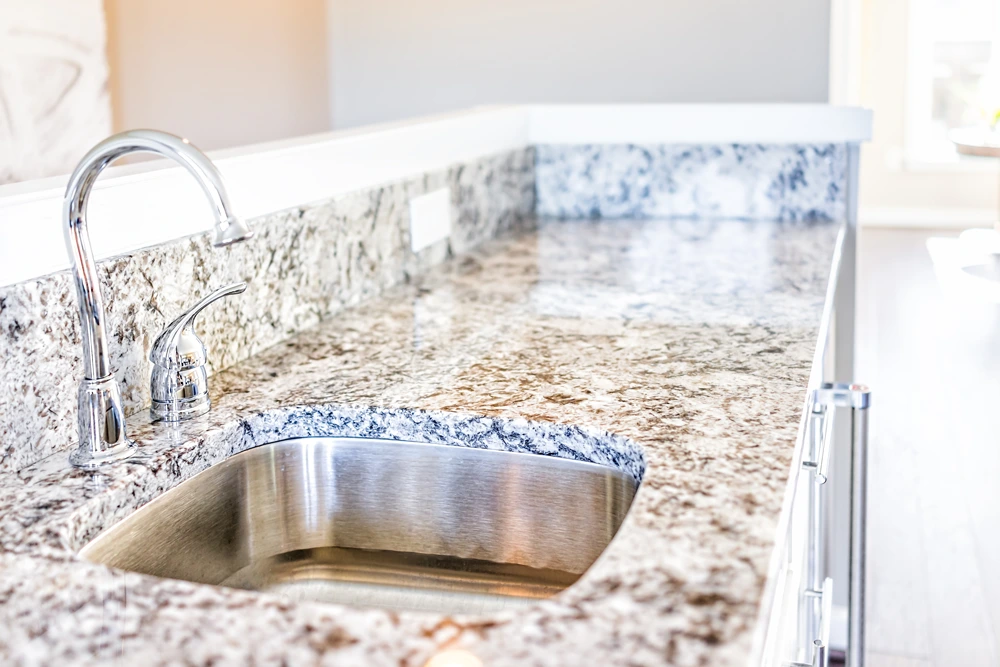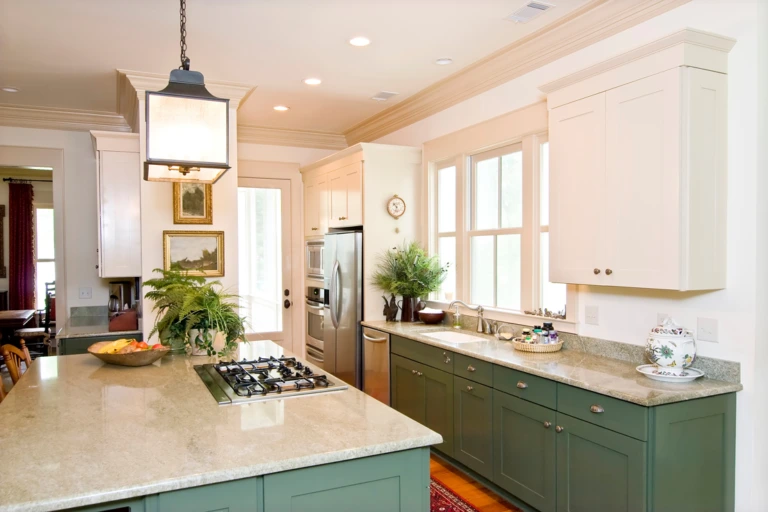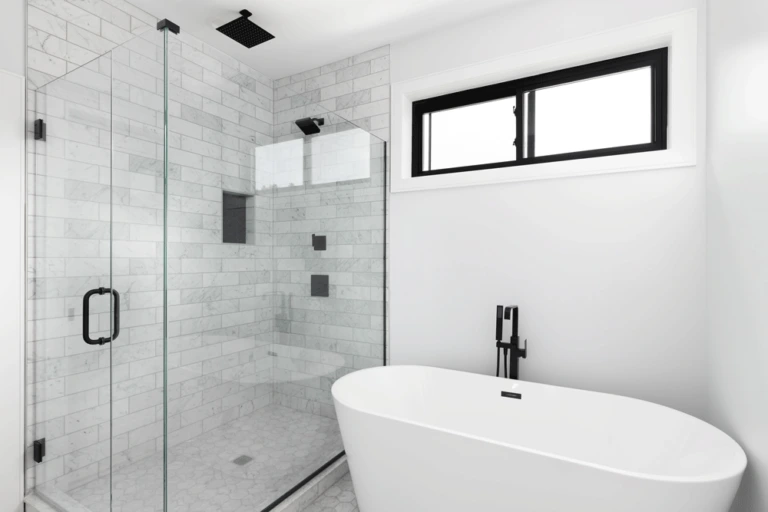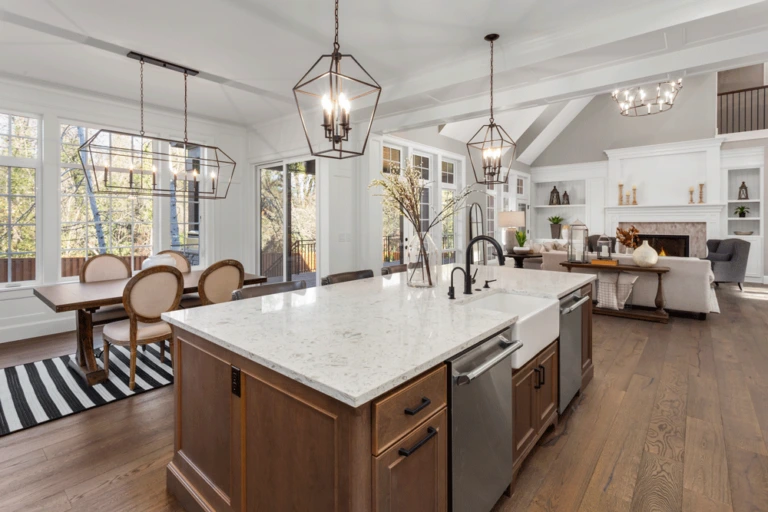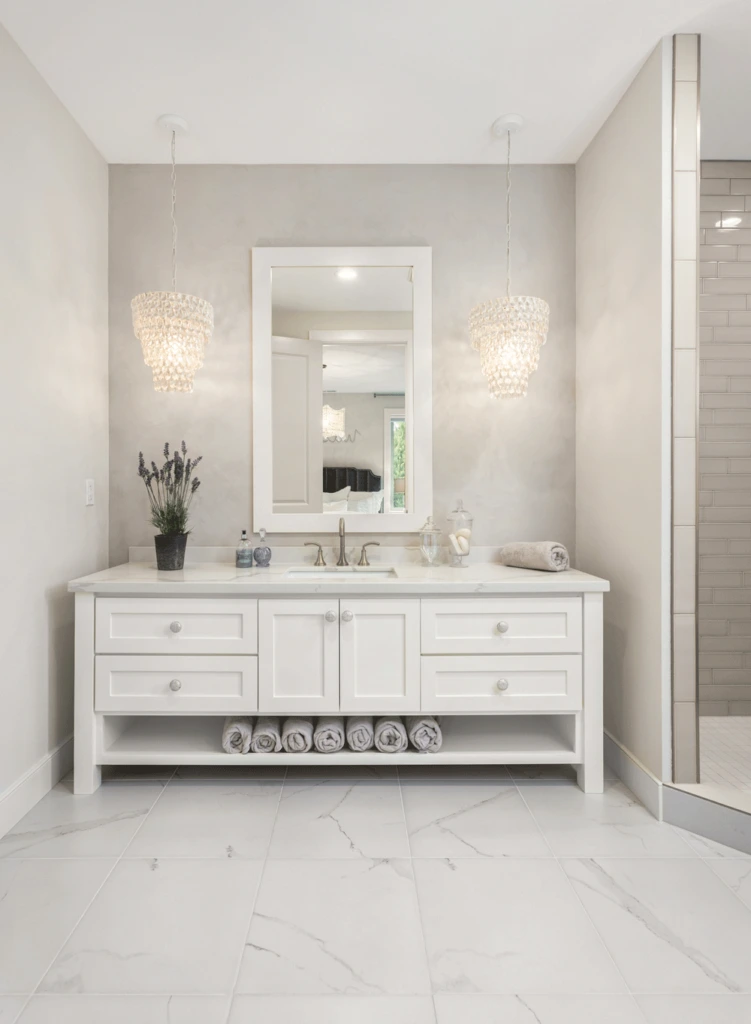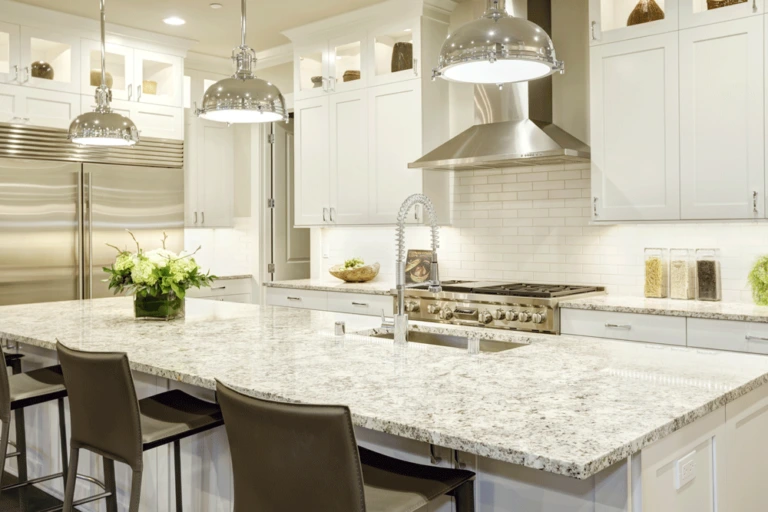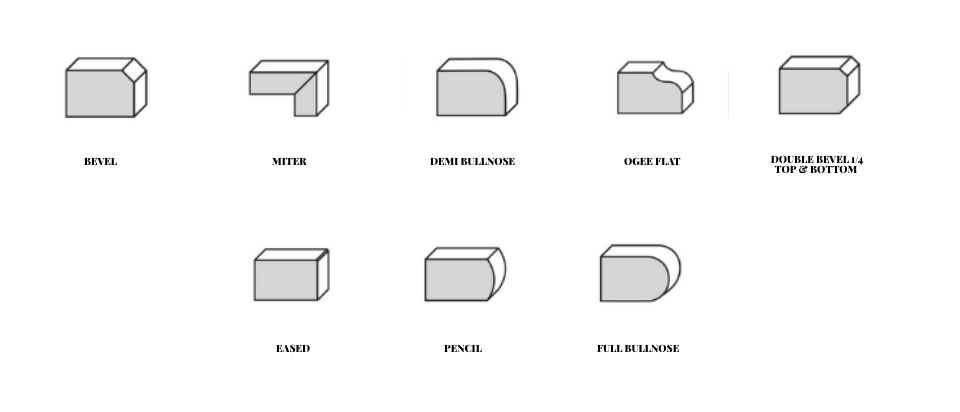(210) 772-7958
Custom Granite and Quartz Countertops San Antonio
Get the countertops of your dreams for a price you won't believe.
Serving San Antonio and surrounding areas.
100%
1,000+
Material Choices
25+
Years of Experience
Services
We offer top-notch granite countertops and quartz countertops in San Antonio Texas. We also specialize in other stone materials, such as marble, quartzite, and Dekton. We offer custom countertops for kitchens, bathrooms, showers, and outdoor kitchens to meet your specific needs.
We go beyond standard fabrication by working directly with you to realize your design ideas. Our focus on detail ensures that we deliver beautiful, functional stone countertops that enhance your space. Experience exceptional quality and personalized service with every project, reflecting our dedication to outstanding results.
Material Types
Our San Antonio location offers a wide selection of premium countertop options, including granite countertops, quartz countertops, and more. Our diverse range of materials also includes marble, quartzite, porcelain, and Dekton. Whether you need granite countertops for your kitchen, quartz countertops for bathroom vanities, or durable surfaces for shower surrounds and outdoor kitchens, we provide tailored solutions to meet your specific needs.
Granite
Quartz
Marble
Quartzite
Porcelain
Dekton
A Family Company
With a legacy of 25 years of service, we proudly serve San Antonio and its neighboring areas.
As a family-owned business, we pride ourselves on values like integrity, reliability, and top-notch quality. Our dedication to excellence is demonstrated through our use of cutting-edge technology and a state-of-the-art digital fabrication process. We specialize in granite countertops and quartz countertops in San Antonio, offering exceptional stone countertops with a focus on excellent communication.
Our team ensures that every client is informed and satisfied throughout the process. With our commitment to quick turnaround times, we deliver beautiful and durable surfaces efficiently without sacrificing quality.
Meet The Team
Led by Andrew Phillips, a seasoned expert with over 25 years of experience in stone fabrication and advanced digital countertop techniques, the Phillips Stoneworks team is dedicated to delivering excellence in every project. Specializing in crafting premium granite countertops, quartz countertops, and custom surfaces, we combine traditional craftsmanship with modern innovation to create stunning results.
Our commitment to precision and quality ensures that every countertop we fabricate elevates the beauty and functionality of your home or business. From kitchen countertops to bathroom vanities and outdoor kitchens, our team transforms your vision into reality with unparalleled expertise.
Frequently Asked Questions
What is Granite?
Granite is a type of igneous rock that is formed from the slow crystallization of magma beneath the Earth’s surface. It’s composed primarily of quartz, feldspar, and mica minerals, along with other trace minerals.
Granite is renowned for its durability, hardness, and resistance to scratches and heat. It typically exhibits a granular texture, with visible grains of various sizes and colors. The color of granite can vary widely depending on the mineral composition, ranging from light hues like white, gray, and beige to darker shades like black, brown, and green. Some granites also feature striking patterns and veining.
Due to its durability and aesthetic appeal, granite is commonly used as a material for countertops. It’s a popular choice for kitchens and bathrooms because of its ability to withstand daily wear and tear, heat from hot pans, and resistance to staining when properly sealed.
What is Marble?
Marble is a metamorphic rock that forms from the recrystallization of limestone under high temperature and pressure deep within the Earth’s crust. It’s composed primarily of calcite or dolomite minerals, which give it its characteristic veining and color variations.
Marble is renowned for its elegance, beauty, and luxurious appearance. It typically features a smooth, polished surface and can exhibit a wide range of colors, including white, gray, beige, green, pink, and black, depending on the minerals present and any impurities in the original limestone.
One of the most distinctive features of marble is its veining, which can range from subtle to bold and dramatic. This veining occurs due to the presence of mineral impurities such as clay, silt, sand, or iron oxides that were present during the formation of the marble.
While marble is prized for its beauty, it is softer and more porous than some other natural stone materials like granite and quartzite, making it more susceptible to scratching, staining, and etching from acidic substances. Proper sealing and maintenance are important to protect marble surfaces and preserve their appearance over time.
What is Quartzite?
Quartzite is a natural metamorphic rock that forms from sandstone under high heat and pressure within the Earth’s crust. It’s primarily composed of quartz grains, which are cemented together other minerals. Quartzite is renowned for its hardness, durability, and attractive appearance.
Unlike quartz, which is an engineered stone made from crushed quartz crystals and resin, quartzite is a naturally occurring stone. It typically features a granular texture and can exhibit a wide range of colors, including white, gray, beige, pink, and yellow, depending on the mineral impurities present during its formation.
One of the distinguishing characteristics of quartzite is its ability to resemble marble in appearance, with similar veining and color patterns. However, quartzite is much harder and more resistant to scratching, staining, and heat compared to marble.
Quartzite is commonly used as a material for countertops, flooring, wall cladding, and other architectural applications due to its durability and aesthetic appeal. It’s particularly popular for kitchen countertops and bathroom vanities because of its resistance to heat and staining. Additionally, quartzite’s natural beauty and unique patterns make it a sought-after choice for interior design projects.
Although quartzite is a durable material, it’s important to note that it still requires proper sealing and maintenance to protect it from potential damage and preserve its appearance over time.
Will My Countertops Get Scratched?
Whether your countertops will get scratched depends on several factors, including the type of material they are made of, how you use them, and how well you maintain them.
Material: Some materials, like granite, quartzite, and quartz, are highly scratch-resistant due to their hardness and durability. Marble, on the other hand, is softer and more prone to scratching. Porcelain and Dekton are also known for their scratch resistance.
Usage: Heavy, sharp objects such as knives or metal utensils can potentially scratch most countertop materials, even those that are considered scratch-resistant. It’s essential to use cutting boards and avoid dragging sharp objects directly on the surface to minimize the risk of scratches.
Maintenance: Regular cleaning and proper maintenance can help prevent scratches and maintain the appearance of your countertops. Some materials may require periodic sealing to enhance their resistance to scratches and stains.
By choosing a durable material, using cutting boards and trivets, and following proper maintenance practices, you can significantly reduce the likelihood of scratches on your countertops.
Will My Countertops Stain?
The susceptibility of your countertops to staining depends on the type of material they are made of and how well they are sealed and maintained. Here’s a general overview:
Granite: Granite is relatively resistant to staining when properly sealed. However, lighter-colored granites may be more prone to staining than darker ones because they can show stains more prominently. It’s essential to seal granite countertops regularly to help prevent stains.
Quartzite: Quartzite is also resistant to staining, particularly when it’s properly sealed. Like granite, lighter-colored quartzite may be more susceptible to staining, so regular sealing is recommended.
Quartz: Quartz countertops are non-porous and highly resistant to staining due to their engineered nature. They don’t require sealing like natural stone countertops do, making them very low-maintenance in terms of stain resistance.
Marble: Marble is more prone to staining than granite or quartzite because it is softer and more porous. Acidic substances like citrus juices, vinegar, and wine can etch the surface of marble and cause stains. Sealing marble regularly can help minimize the risk of staining, but it’s still essential to clean up spills promptly.
Porcelain: Porcelain countertops are highly resistant to staining due to their non-porous nature. They are impervious to liquids and do not require sealing.
Dekton: Dekton countertops are also highly resistant to staining due to their dense composition. They are non-porous and do not require sealing.
Can I Place Hot Items On My Countertops?
The ability to place hot items on your countertops varies depending on the material they are made of. Here’s a general overview:
Granite: Granite countertops are heat-resistant and can typically withstand moderately hot temperatures. However, it’s still a good idea to use trivets or hot pads to protect the surface and prevent any potential damage from extreme heat.
Quartzite: Quartzite countertops are also heat-resistant and can tolerate high temperatures. However, it’s advisable to use caution and avoid placing extremely hot pots or pans directly on the surface to prevent any potential thermal shock.
Quartz: Quartz countertops are engineered to be heat-resistant, but they are not entirely heat-proof. While they can withstand moderately hot temperatures, it’s best to use trivets or hot pads to protect the surface from prolonged exposure to heat.
Marble: Marble countertops are less heat-resistant than granite or quartzite and can be more prone to thermal damage. Placing hot pots or pans directly on marble surfaces can potentially cause discoloration, etching, or cracking. It’s recommended to use trivets or hot pads to protect marble countertops from heat damage.
Porcelain: Porcelain countertops are highly heat-resistant and can withstand extreme temperatures without being damaged. You can safely place hot pots, pans, or baking dishes directly on porcelain surfaces without worrying about heat damage.
Dekton: Dekton countertops are extremely heat-resistant and can withstand high temperatures without being damaged. You can confidently place hot items directly on Dekton surfaces
How Do I Care For My Natural Stone?
Caring for natural stone countertops, such as granite, marble, and quartzite, requires regular maintenance to preserve their beauty and durability. Here are some general tips for caring for natural stone:
Sealing: Most natural stone countertops are porous to some extent, making them susceptible to staining. It’s essential to seal your countertops regularly with a quality stone sealer to create a protective barrier against spills and stains. The frequency of sealing depends on the type of stone and the sealer used, but as a general guideline, it’s recommended to seal natural stone countertops at least once a year, if not more frequently.
Cleaning: Use a pH-balanced stone cleaner or a mild dish soap diluted in warm water to clean your natural stone countertops regularly. Avoid using acidic or abrasive cleaners, as they can damage the surface of the stone. Wipe up spills promptly to prevent them from penetrating the stone and causing stains.
Avoid Harsh Chemicals: Avoid using harsh chemicals, such as bleach, ammonia, or vinegar, on natural stone countertops, as they can dull the finish and etch the surface. Stick to cleaners specifically formulated for natural stone or plain soap and water.
Use Cutting Boards and Trivets: To prevent scratching and etching, always use cutting boards and trivets when working with knives or placing hot pots and pans on your natural stone countertops. Avoid dragging heavy or sharp objects across the surface, as this can cause scratches and damage the stone.
Protect Against Etching: Certain acidic substances, such as citrus juices, wine, and vinegar, can etch the surface of natural stone countertops, particularly marble. Wipe up spills promptly and avoid placing acidic foods directly on the countertop to prevent etching.
Routine Maintenance: Regularly inspect your natural stone countertops for signs of wear and tear, such as scratches, chips, or cracks. Address any issues promptly to prevent them from worsening over time. Consider hiring a professional stone restoration specialist for deep cleaning, polishing, and repairs as needed.
By following these care and maintenance tips, you can keep your natural stone countertops looking beautiful and in excellent condition for years to come.
What Is Sealing? Should I Have It Done?
Sealing is the process of applying a protective sealant to natural stone surfaces, such as granite, marble, and quartzite, to help prevent stains and moisture absorption. Sealants work by penetrating the pores of the stone and creating a barrier that repels liquids and reduces the risk of staining.
Whether you should have your natural stone countertops sealed depends on several factors:
Type of Stone: Some types of natural stone are more porous than others and therefore more prone to staining. Marble, for example, is relatively soft and porous, making it more susceptible to staining compared to granite or quartzite. Sealing is particularly important for porous stones to protect them from stains and moisture damage.
Usage: Consider how you use your countertops and the likelihood of spills or exposure to staining substances. If your countertops are in a high-traffic area like the kitchen and are frequently exposed to food, beverages, and cooking oils, sealing can provide added protection against stains.
Maintenance: Sealing is part of regular maintenance for natural stone countertops. It helps prolong the lifespan of the stone and makes it easier to clean and maintain over time. Properly sealed countertops are also less likely to require deep cleaning or restoration in the future.
Frequency of Sealing: The frequency of sealing depends on the type of stone, the quality of the sealant used, and the level of usage. As a general guideline, it’s recommended to seal natural stone countertops at least once a year, if not more frequently for highly porous stones or areas with heavy use.
If you’re unsure whether your natural stone countertops need sealing, you can perform a simple water test to check their absorbency. Sprinkle a few drops of water on the countertop surface and observe how quickly the water is absorbed. If the water beads up and does not penetrate the surface, your countertops are adequately sealed. If the water is absorbed quickly and leaves a darkened spot, it may be time to reseal your countertops.
In summary, sealing natural stone countertops can provide added protection against stains and moisture damage, especially for porous stones like marble. It’s generally recommended as part of regular maintenance to preserve the beauty and durability of your countertops over time.
Free In-Home Estimates.
Military, Veterans, First Responders Discount Available
We want to hear from you
Schedule Your Free In-Home Estimate Today!
Get the Best Countertops in San Antonio Today
If you’re searching for the best quartz countertops San Antonio, look no further than Phillips Stoneworks. We specialize in providing a wide range of premium stone options, including granite countertops and quartz countertops, tailored to meet the unique needs of homeowners, architects, and contractors. Our experienced team is dedicated to helping you choose the perfect materials for your project, offering precise estimates and expert design guidance to ensure your vision comes to life.
When it comes to choosing between granite and quartz for your countertops, it’s crucial to understand the unique advantages of each material. Granite, formed from volcanic magma, is renowned for its striking natural patterns and vibrant colors like black, blue, and gold. Its exceptional durability and heat resistance make it perfect for high-traffic areas such as kitchens and bathrooms. Sealed granite surfaces are not only clean but also free from bacteria, making them a hygienic choice for any home.
On the other hand, quartz countertops offer a sophisticated alternative with their engineered composition. This material provides an almost limitless array of colors and patterns, allowing for extensive customization. Quartz is bonded with resin to create a non-porous surface that is easy to clean and highly resistant to stains. This exceptional durability and low maintenance make quartz countertops versatile and long-lasting for various applications.
At Phillips Stoneworks, we are unwavering in our commitment to delivering top-quality countertops and exceptional customer service. Whether you’re renovating your kitchen, upgrading your bathroom, or designing an outdoor space, we’re here to provide the best solutions for your needs.
Contact us today to explore our countertop options and discover how we can help you achieve your project goals.


